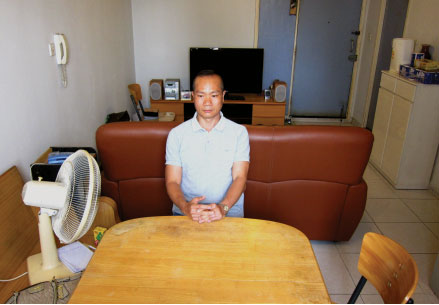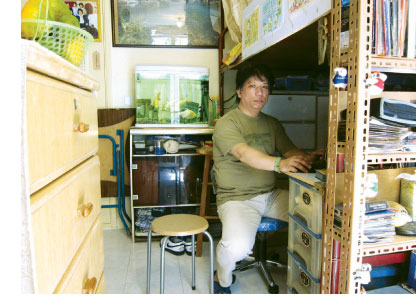Struggling for a place to call home
Updated: 2012-10-18 07:11
By Guo Jiaxue(HK Edition)
|
|||||||||

|
Chui Tong-kit is sitting at dinner stable. The 34.44-sqm flat can fit in a three-seat sofa. As a firefighter he spends a lot of time at home when he is not on duty. Guo Jiaxue / China Daily |
|
Kelvin Cheung Tak-kwong is sitting in front of his computer desk. He made the desk by himself, using the space under the loft bed. Guo Jiaxue / China Daily |
They have lost family members, or their children have grown up and moved out, now they live in "under-occupied" public housing units - and because of a government crackdown, many are being forced to move. Guo Jiaxue reports.
When 49-year-old night-shift taxi driver Kelvin Cheung Tak-kwong hit the wooden wall with a hammer, he felt as though it was hitting his heart.
"My (late) father built up the wall with his own hands, (to separate the bedrooms from the rest of the flat) more than 10 years ago, but I destroyed it."
It was the last day before he moved out of the flat where he lived with his late father and a younger brother for more than a decade. His things were already packed in red, white and blue plastic bags. Sitting alone in the empty flat, Cheung looked miserable.
Two years ago, less than a week after he updated the household registration with the administration, shortly after his father died, he was told that his flat was one of the "most serious" cases of under-occupation, in public rental housing. He was asked to move into a smaller one-person unit.
Public housing is allocated according to household sizes under established allocation standards. A single person is usually given a unit of around 17 square meters (sqm), while a three-person family can have a flat of about 34 sqm. Over time, when family members move out, or die, the remaining members of the household, eventually find themselves occupying a place considered, under-occupied. By March 2012, 7 percent of the existing 700,000 plus, public rental housing households, or about 50,000 households, were under-occupied. The majority of those are one-person households.
However, as the waiting list of public housing applicants grows longer and longer in recent years, the Housing Authority is taking a tough stand on relocating tenants in under-occupied flats, to help address the strong demand.
In October 2010, the Authority tightened the definition of "most serious under-occupation households" by a scanty one sqm, (which is from 35 sqm to 34 sqm).
The immediate implication of the change was that a large number of flats fell into the category of "seriously under-occupied).
According to a document submitted to the Legislative Council by the Transport and Housing Bureau, there were 550 "most serious cases" by the end of 2010. But after the change of standard, the number of cases soared to some 3,000. The bureau set out to resolve under-occupancy within two years.
Cheung was just one of those who fell into the "most serious" category after the re-definition. He was living in a 34.76-sqm flat at On Yam Estate, exceeding the limit by 0.76 sqm. He was offered a unit of less than 14 sqm.
"It was small, dilapidated, dirty, and narrow. Through the only window all you can see is a close-up view of concrete walls."
Cheung told the government that he would not move into a flat of less than 20 sqm. He joined in constant protests and demonstrations. After a year and a half, he accepted an offer to move into a more spacious 23-sqm flat at Shek Yam Estate.
Moving was exhausting and tough for a man like Cheung, who treasured so many memories of the place. To him, everything in the old flat was memorable. He remembers his late father separating the two bedrooms with wooden boards, by himself, to save the decoration fee. The double decker metal bed was installed by the old man when he was over 60. He remembers his father suffering from hemiplegia as his strength ebbed away, preferring to lie on the sofa in the living room, where the air was better. Now he was throwing all the large furniture pieces, because they wouldn't fit in his 23-sqm flat.
"I spent three days just throwing away things. Sofa, refrigerator, closets...Even the trash bin - it was still quite new, but I have to buy a smaller one. Such a waste," he said, as he sat in his new, single-person flat. The space of the tiny room was well planned and laid out. A 30-year-old puzzle finished by the family members together and a 20-year-old clock were hung on the wall.
The moving, decoration and other related expenses cost him HK$100,000. "The government offered some HK$3,000 moving allowance. Far from enough," he said.
Now, a mandated review of the policy and the overall situation is approaching. According to the Housing Authority, as at March 2012, there were still around 2,000 "most serious" cases.
"I am a firefighter. I was never scared of entering a fire site. But now, everytime when I open my mailbox, my hands couldn't stop shaking," said Chui Tong-kit, a 51-year-old living in a 34.44-sqm flat at Kwai Shing East Estate
Chui and his 83-year-old mother were offered the three-person flat in 1998, because their old place was being redeveloped by the government. As a public servant he immediately realized they were offered too much space and would fall among those classed as living in under-occupied apartments. He inquired from Housing Authority officers and he was told not to worry because the flat would eventually be sold to him.
The son and mother moved in full of excited anticipation. "It was like we won the Mark Six. My mother was so happy. It's still fresh in my memory now, " Chui said.
Happiness was short-lived. His mother died just two week after they moved in. Chui was told to move when he went to update the household registration. He was shocked, "Just a few days later everything changed." With the help of a district councillor he was able to stay, as long as there was no complaints. However, after the adjustment, of the most serious under-occupancy cases in 2010, he was once again put over the edge of having to move again.
He doesn't want to move into a single-person unit. "Some recently built one-person flats were just about 14-sqm, like government-run sub-divided units," he characterized them. The fear of moving stopped him from updating furniture because it might be too big to fit a tiny flat. "For the past more than 10 years, I don't have drying racks though I wanted them from the very beginning."
"Of course, it's more comfortable to live in a bigger place," he said and gave a shy smile, He admitted that he feels a little bit embarrassed for not moving out.
"But it was not my fault. The government put me here in the first place. It should not be me who bears the consequence," he said, "what's more, the policy is not very reasonable, but pretty disturbing. There are always increasing or decreasing numbers of family members. That means people can not have a stable home."
According to the current policy, if residents of the most serious under-occupied households refuse all four offers without good reason, they will be asked to quit public housing by the Housing Authority.
Now, Chui's case was temporarily suspended, considering he has a girlfriend and may be get married soon. Chui admitted that he's actually still single.
Organiser of the Neighborhood & Worker's Service Centre Loong Tse-wai, who's familiar with many of the most serious under-occupation cases, confirmed that a few of them have been suspended for different reasons. In one case, the occupant's mainland family is applying for a One-way Permit and is expected to join the household soon.
"It is a kind of discretion. We can say it is a result of tenants coping with the Housing Authority officers while the officers have to cope with the pressure from above."
Loong and his colleagues have been organising protests against the under-occupation policy. He argues that this is a policy failure that has not helped the public get a better relocation of "Hong Kong's previous public housing resources".
The relocating of these people into one-person flats will worsen the already-very-tight supply of small-size units in the face of soaring demand. "The under-occupation policy will only exacerbate the imbalance," he said.
The problem of rapidly increasing single applicants for public housing is growing greater and greater these years. As at June 2012, there were 199,600 applications on the Housing Authority's Waiting List for public rental housing, of which 93,500 are non-elderly, one-person applicants under the Quota and Points System. The number of single applicants below 30 on the waiting list has jumped by more than 20,000. The Housing Authority says the latest figure is nearly six times the number four years ago (See Friday's HK Focus story). "But the supply for single applicants is only 2,000 every year," Loong stressed.
He believes the Authority has softened its attitude a little bit in the past two years in the face of frequent protests. He is hoping the coming biannual review on the policy by the Housing Authority will withdraw the one-sqm adjustment.
Speaking for the affected public housing households is not alway appreciated. On the Internet, there are many complains that these "under occupiers" are abusing government resources and they should move.
"I have kind of already got used to it," Loong said, "Well if we just conclude what happened in one sentence, yes they are indeed living in big flats. But if we look closely enough, things are always complicated. It's hard to simply say it's wrong."
When asked whether it's unfair for those three or four-person families who are still on the waiting list, Loong said that he believes these people should not be placed on exact opposite sides.
"The real question is, why there are so many people waiting for public houses."
(HK Edition 10/18/2012 page4)

